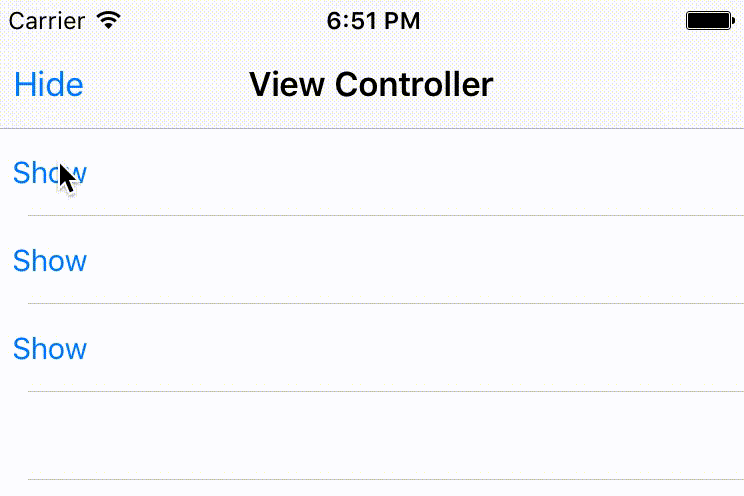I have a UIPageViewController that have UITableViewControllers inside it, and the swipe left gestures are conflicted between the UIPageViewController to change between the views and the UITableViewCells gesture to open the edit actions, so I need to show the edit actions when a certain button is clicked in the cell.
My question is can I show the edit action buttons programmatically instead of showing them on the swipe gesture?
Apple has a private API that lets you do this, however, be warned that this may get your app rejected from the App Store unless you obfuscate the usage of said API using something like Method Swizzling. Here are the steps to do so:
Create a protocol called PrivateMethodRevealer that lets you access the required private Apple APIs, namely the ones to show and dismiss edit actions. Credits to this answer for providing this method of exposing private APIs. The methods in the protocol are declared as optional, so that in case Apple changes the name of the method, the app will not crash, but rather, it'll just not show the edit actions.
@objc protocol PrivateMethodRevealer {
optional func setShowingDeleteConfirmation(arg1: Bool)
optional func _endSwipeToDeleteRowDidDelete(arg1: Bool)
}
Note that although the methods refer to delete, this shows all the UITableViewRowActions that are on the cell.
Create a function that handles the showing and hiding of the edit actions in your UITableViewCell subclass (if you have one), or create the method in a UITableViewCell extension. I will name this method showActions for demonstrative purposes.
Add the following body to your function:
func showActions() {
(superview?.superview as? AnyObject)?._endSwipeToDeleteRowDidDelete?(false)
(self as AnyObject).setShowingDeleteConfirmation?(true)
}
This firstly dismisses any visible cells' editing actions, by calling _endSwipeToDeleteRowDidDelete: on the UITableView (which is the cell's superview's superview), and then shows the cell's own editing actions (by calling setShowingDeleteConfirmation:). Note that we need to dismiss other cells' actions as showing multiple rows with edit actions is extremely buggy.
If you want, you may also create a button in the UIViewController that dismisses any currently editing cells. To do this, just call the following method, where tableView is your reference to the UITableView:
(tableView as AnyObject)?._endSwipeToDeleteRowDidDelete?(false)
If the swipe gestures between your UIPageViewController and UITableViewCells are conflicting, simply override the tableView:editingStyleForRowAtIndexPath: method to return .None.
In the end, your code might produce the following result

EDIT: Here is a quick way to hide the usage of your API using method swizzling. Credits to this website for providing the basic implementation of this method. Be warned that I can't guarantee that it'll work, as it isn't possible to test it live.
To do this, replace the protocols with the following code, and wherever you call setShowingDeleteConfirmation(true) or _endSwipeToDeleteRowDidDelete(false), replace it with showRowActions() and hideRowActions() instead. This method appears to have some unintended effects however, such as the UITableViewCells not responding to user interaction whilst edit actions are visible.
extension UITableViewCell {
func showRowActions(arg1: Bool = true) {}
public override static func initialize() {
struct Static {
static var token: dispatch_once_t = 0
}
guard self === UITableViewCell.self else {return}
dispatch_once(&Static.token) {
let hiddenString = String(":noitamrifnoCeteleDgniwohStes".characters.reverse())
let originalSelector = NSSelectorFromString(hiddenString)
let swizzledSelector = #selector(showRowActions(_:))
let originalMethod = class_getInstanceMethod(self, originalSelector)
let swizzledMethod = class_getInstanceMethod(self, swizzledSelector)
class_addMethod(self, originalSelector, method_getImplementation(swizzledMethod), method_getTypeEncoding(swizzledMethod))
method_exchangeImplementations(originalMethod, swizzledMethod)
}
}
}
extension UITableView {
func hideRowActions(arg1: Bool = false) {}
public override static func initialize() {
struct Static {
static var token: dispatch_once_t = 0
}
guard self === UITableView.self else {return}
dispatch_once(&Static.token) {
let hiddenString = String(":eteleDdiDwoReteleDoTepiwSdne_".characters.reverse())
let originalSelector = NSSelectorFromString(hiddenString)
let swizzledSelector = #selector(hideRowActions(_:))
let originalMethod = class_getInstanceMethod(self, originalSelector)
let swizzledMethod = class_getInstanceMethod(self, swizzledSelector)
class_addMethod(self, originalSelector, method_getImplementation(swizzledMethod), method_getTypeEncoding(swizzledMethod))
method_exchangeImplementations(originalMethod, swizzledMethod)
}
}
}
If you love us? You can donate to us via Paypal or buy me a coffee so we can maintain and grow! Thank you!
Donate Us With